17 Aug2020
By Mia Tuan, Tammy Campbell and Denise Juneau
This article originally appeared on The Seattle Times website and is reprinted with permission.

We see in our nation today the devastating repercussions of white supremacy and systemic racism practiced against communities of color for generations. It’s a grievous offense that our educational systems, which possess a duty to help every child achieve their full potential, often act as instruments to deny this opportunity to all.
As educators of color with decades of experience teaching and leading, we know that education is central to the elimination of racism in society and a more just future for all of us. Education can disrupt entrenched biases. It can amplify our communities’ stories of strength, and achievement and be a force for liberation and self-determination.
While there are many actions we can and should take at every level of our educational systems, the evidence is clear what our first priority must be: investing in a more racially diverse educator workforce.
Here in Washington state, half of K-12 students in public schools are youth of color. Yet only 11% of teachers are.
11 Aug2020
By Jacqueline Rodriguez

This year’s Capital Hill visits during Washington Week will feature AACTE’s DEI Handbook, which will include your strategies to elevate diversity, equity, and inclusion within your institutions.
What might those strategies look like? We are glad you asked! While DEI may be a broad concept, we are most interested in learning about how you are supporting the recruitment and retention of students and faculty of color on your campus. We also want to know how you are supporting your faculty and staff to become culturally competent in their teaching, research, and in their community engagement.
Why should you submit your strategies? You are shaping the field! Your practices matter to your colleagues, to your peer institutions, and importantly to your Congressional leaders:
- AACTE members want to learn from you.
- Your peers want to develop their own strategies and build off of your models.
- Your Congressional leaders need the evidence of your strategies to advocate for increased funding.
07 Aug2020
By Jackson Holtz
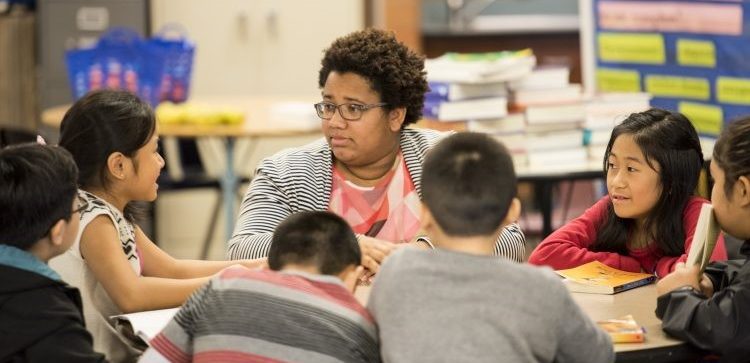
The University of Washington today announced a $6 million anonymous gift earmarked to bolster diversity in the education workforce, a key driver in ultimate K-12 student success, especially for students of color.
The gift will expand financial support for and recruitment of teacher candidates from diverse backgrounds, including candidates of color and those who are multilingual. In addition, the gift provides professional learning and supports to enhance retention in the teaching workforce, and evaluation and dissemination of the key learnings to aid efforts across the nation to boost the racial, ethnic and linguistic diversity of teachers entering the profession.
“This extraordinary and generous donation will help to develop a more diverse and representative educational workforce,” said UW President Ana Mari Cauce. “We are deeply grateful for this forward-looking gift that will do so much to benefit students, especially multilingual students and students of color, as well as the students they go on to teach and mentor as educators.”
07 Aug2020
By John Henning and Stacey Leftwich
The theme of the Third Annual New Jersey Convening on Diversifying the Teacher Workforce is “Leadership for Diversity: Creating Culturally Responsive Recruitment, Instructional Practice and Retention Strategies.”
The New Jersey Diversifying the Teacher Workforce Convening, co-sponsored by Rutgers University Graduate School of Education, New Jersey Department of Education, and the New Jersey Association of Colleges for Teacher Education is intended to address the serious need to increase the diversity of the New Jersey teaching population and increase culturally responsive practices in the state. This meeting is designed to engage stakeholders and constituents in New Jersey in considering the barriers and supports to diversifying the teacher workforce to increase our numbers of culturally responsive practitioners and to develop culturally responsive practices among New Jersey’s educators. This convening will also provide opportunities for participants to learn about promising and successful efforts to increase teacher diversity in New Jersey and for growing and sustaining culturally responsive educators.
03 Aug2020
By AACTE

On behalf of the Board of Directors of the American Association of Colleges for Teacher Education (AACTE), President and CEO Lynn M. Gangone issued the following statement today regarding the Immigration and Customs Enforcement agency’s guidance that forces colleges and universities to reopen with in-person classes:
“AACTE is appalled by efforts to deny international students from attending U.S. colleges and universities on the basis of enrollment in online versus in-person classes. The U.S. Immigration and Customs Enforcement agency’s position prohibits new or initial students on foreign visas after March 9 from entering the country and enrolling in fully online courses, thus forcing them to take other measures, such as transferring to a school with in-person instruction this fall. This policy is both harmful to the health, safety, and overall well-being of the students and detrimental to their educational trajectories. Additionally, this action exacerbates the complex challenges institutions of higher education already face during this unprecedented time.
03 Aug2020
By Jacqueline Rodriguez

AACTE wants to celebrate your successful strategies to diversify the profession and professionally develop your faculty and staff. We plan to share members’ strategies in a handbook focused on diversity, equity, and inclusion. This handbook will be distributed to congressional leaders and their staff during Washington Week 2020. The handbook will also be located on the AACTE website for our members to share their successes with one another.
Now that you’ve read about the Handbook, you’re likely planning your submission. We want to support you every step of the way. Below are a few tips for a successful submission to the DEI Handbook.
03 Aug2020
By Katrina Norfleet
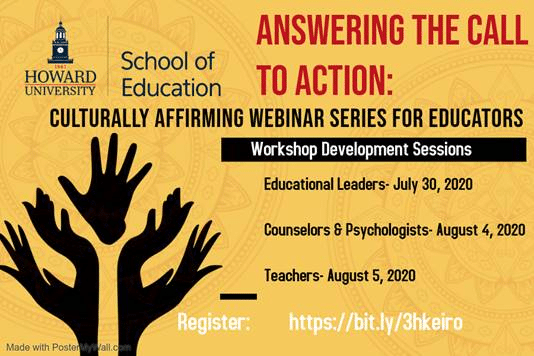
As part of a three-part Answering the Call to Action: Culturally Affirming Webinar Series, member institution Howard University College of Education will present its third session: “How Educators can use their Sphere of Influence to Decolonize the Classroom” on Wednesday, August 5, 2:00 – 3:30 p.m.
In addition to an overview on decolonization, the webinar offers three breakout sessions, which registrants will select in advance:
- Break Out Session 1: Anti-racist Education Through People’s History (A mini-lesson)
Deborah Menkart, Teaching for Change
- Break Out Session 2: Conducting Equity Audits
Karmen Rouland, MAEC
- Break Out Session 3: Building a coalition through Black Lives Matter Week of Action in Schools
Denisha Jones, Sarah Lawrence College
The Answering the Call to Action series also included Session 1: “Using Your Leadership in Being the Change That You Want to See,” designed for Educational Leaders and session 2: “Strengthening Mental Health Outcomes by Decolonizing Practices,” designed for School Psychologists and School Counselors.
31 Jul2020
By Jacqueline E. King, Ph.D.
 More than ever, AACTE members are focused on disrupting inequities and advancing racial justice. AACTE is offering two great new opportunities for members to engage in this work with colleagues from across the country. The AACTE Board of Directors recently created two new committee:
More than ever, AACTE members are focused on disrupting inequities and advancing racial justice. AACTE is offering two great new opportunities for members to engage in this work with colleagues from across the country. The AACTE Board of Directors recently created two new committee:
- Advisory Committee on Educator Diversity
- Holmes Program Advisory Committee
These committees will advise AACTE on how it can best help members attract and retain diverse future teachers and other educators and on AACTE’s signature program for future scholars and leaders of color, the Holmes Program.
If you are interested in serving on one of these important new committee—or if you would like to nominate a colleague—please act now! Nominations close on August 7. Learn more and submit your nomination.
28 Jul2020
By Jacqueline Rodriguez

AACTE’s annual Washington Week is going virtual and we are excited to expand the advocacy campaign from a week to a month! This September will be filled with advocacy events that are sure to engage Members of Congress and their staff. Given the national climate, AACTE would like to elevate your invaluable work in the areas of diversity, equity, and inclusion in the midst of the many challenges we are all facing in 2020.
At this year’s Day on the Hill event, we will provide our Members of Congress with a “handbook” comprised of collected strategies by our members, describing their successes at their educator preparation programs (EPPs) in pursuit of diversity, equity and inclusion.
28 Jul2020
By Jacqueline Rodriguez

As a nation, we are facing racially and ethnically grounded injustices, which disproportionately impact our BIPOC students and educators. In a recent letter to Holmes students, AACTE President and CEO Lynn M. Gangone noted “that generations of citizens are molded by their educators, and so the work of fighting for racial equity begins in our member institutions—on your campuses.”
Sadly, the nation’s P-20 educators have never reflected the rich diversity of the students they serve. Gangone notes that while “the work that needs to be done to sow seeds of racial justice in our curriculum and in our teaching practices should not and cannot be solely completed by our students and faculty of color, the invaluable teaching and scholarship contributions of our diverse educators and candidates are the underpinning for system of education each student in our country deserves.
24 Jul2020
By Dustin Wunderlich
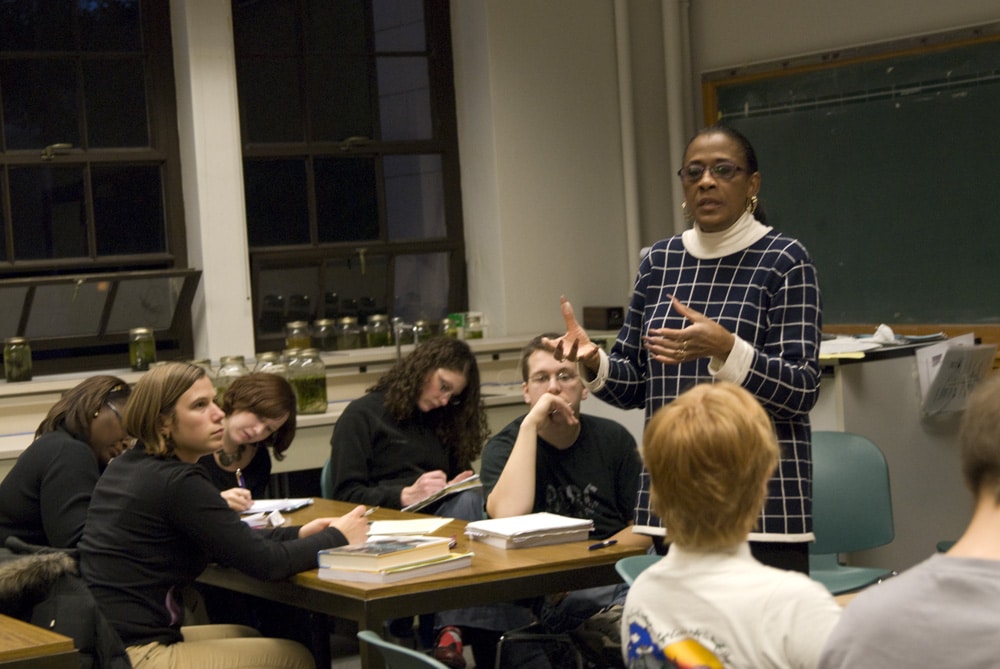
This article originally appeared on the University of Washington website and is reprinted with permission.
When Professor Geneva Gay began her career as a high school social studies teacher more than four decades ago, the concept of multicultural education was still in its infancy. No university had even started offering a doctoral program in the field.
This July, Gay will retire following a 29-year career at the University of Washington College of Education in which her internationally-recognized scholarship has advanced the field in profound ways — while making clear the essential role of multicultural education in an increasingly diverse and interconnected world.
23 Jul2020
By Ashley White and Jane E. West
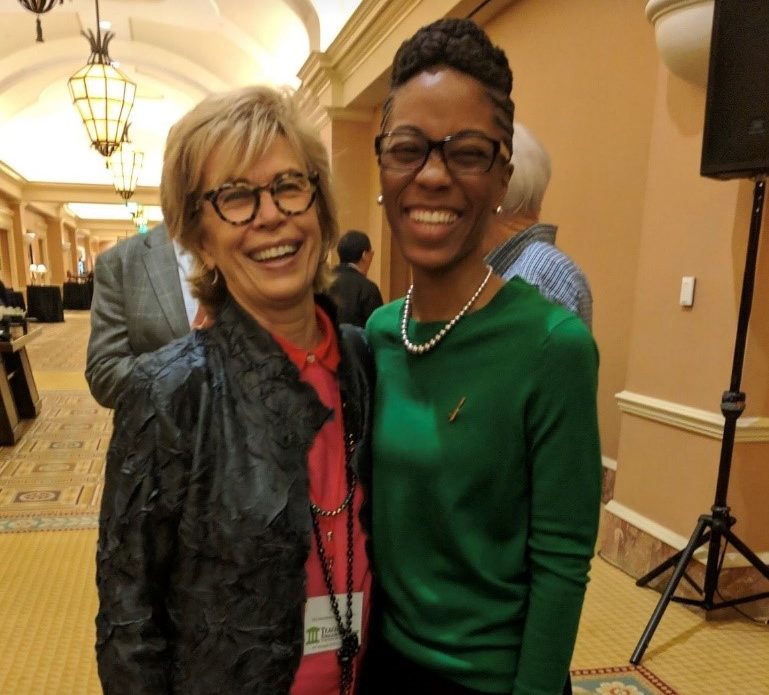 In Part 2 of this Q&A feature, AACTE consultant Jane West, a former teacher with a doctorate in special education and 30 years of policy experience in the nation’s capital, and Holmes Program Alumna Ashley L. White, assistant professor at the University of Wisconsin and 2019-20 Joseph P. Kennedy Fellow, share their mentoring/mentee relationship and how it has evolved over time to address race. (Read Part 1.)
In Part 2 of this Q&A feature, AACTE consultant Jane West, a former teacher with a doctorate in special education and 30 years of policy experience in the nation’s capital, and Holmes Program Alumna Ashley L. White, assistant professor at the University of Wisconsin and 2019-20 Joseph P. Kennedy Fellow, share their mentoring/mentee relationship and how it has evolved over time to address race. (Read Part 1.)
Q: Describe a good white ally.
White: This is not an all-encompassing definition and I am not the monolithic expert—I am speaking from my experiences in dealing with White people all my life, some who get it and many who do not. Allies of any kind have to accept the reality of system and practices that have put them in a position of privilege while disenfranchising others (e.g., the notion of heterosexuality or “able-bodies” as superior forms of existence). Allies must value the whole over the self. Allies must recognize that if one suffers, all suffer, even if not immediately. Allies must embrace their ignorance and lack of understanding in order to counteract these.
As it pertains to the subject of racism in society, racism in education, White allies have to accept the reality of racism in every system and they also have to accept that no matter the topic, particularly as it relates to education, issues of race cement long-standing inequities that cannot be resolved without centering the issues of race. In other words, White allies don’t avoid our country’s foundation, which is built upon individual and systematic racism for the gain of the dominant class. White allies must learn to be quiet when Black and Brown folks are speaking about their experiences and perspectives. White allies must learn not to interrupt and to question themselves, especially when they feel defensive, undermined, or fearful. White allies have to stop hiding behind rhetoric of equity and understanding when their actions demonstrate the very opposite. White allies have to be willing to ask questions, not to prove they are right, but because they know they are wrong.
23 Jul2020
By Jerrica Thurman
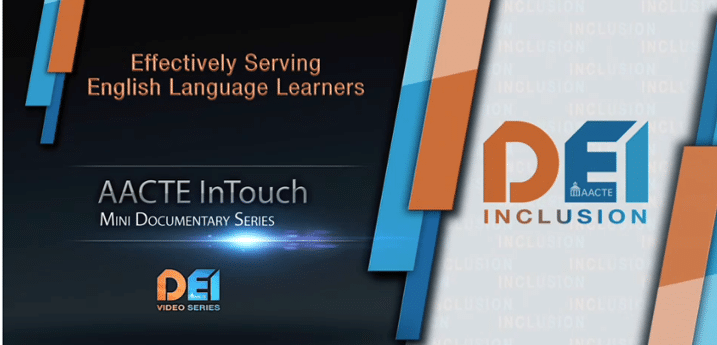
Ed Prep Matters features the “Revolutionizing Education” column to spotlight the many ways AACTE, member institutions, and partners are pioneering leading-edge research, models, strategies and programs that focus on the three core values outlined in the current AACTE strategic plan: Diversity, Equity, and Inclusion; Quality and Impact; and Inquiry and Innovation.
In this final installment of the first Diversity, Equity and Inclusion video series, AACTE members discuss the importance of preparing high quality teachers to educate the growing population of English language learners in the U.S. Statistics show English language learners currently represent 25% of the student body and are expected to grow to 50% within the next five years.
In “Effectively Serving English Language Learners,” Jacqueline Rodriguez, AACTE Vice President, Research, Policy and Advocacy said, “according to the U.S. Department of Education, we’ve seen dramatic increases in English language learners across the country. Some states have increases of over 40% since 2010.” “It’s very important now that we see how our population of students is changing, and what our teacher candidates are facing in the future,” said Cathleen Skinner, director of world languages for Oklahoma State Department of Education. “[We need] to ensure that we are providing our candidates with a kind of content to meet the needs of today’s diverse students, and to make sure that they are comfortable and have had experiences working with families and communities that differ from their own,” said Wanda Blanchett, dean of the graduate school of education at Rutgers University New Brunswick. “That means the teachers are going to have to develop relationships with people outside the educational community,” said Brian Williams, director of the Alonzo A. Crim Center for Urban Educational Excellence at Georgia State University.
Watch the full video.
View the complete first series of AACTE’s DEI videos on the Video Wall. Stay tuned for the second series of the DEI videos coming this fall. Help AACTE spread the word by sharing the videos with your social network!
20 Jul2020
By Ashley White and Jane E. West
In Part 1 of this Q&A feature, AACTE consultant Jane West, a former teacher with a doctorate in special education and 30 years of policy experience in the nation’s capital, and Holmes Program Alumna Ashley L. White, assistant professor at the University of Wisconsin and 2019-20 Joseph P. Kennedy Fellow, share their mentoring/mentee relationship and how it has evolved over time to address race.
Q: What is the nature of your mentoring relationship?
 White: Through my doctoral work, I became very interested in disability policy. It was through this interest that I met Jane. Anyone who knows about SPED/disability policy knows Dr. Jane West. What I didn’t know before interacting with Jane is that, while she was an advocate for the interests of special education and students with disabilities, she was aware of the structural and ideological inconsistencies that float right beneath the surface of the equity rhetoric that dominates disability advocacy.
White: Through my doctoral work, I became very interested in disability policy. It was through this interest that I met Jane. Anyone who knows about SPED/disability policy knows Dr. Jane West. What I didn’t know before interacting with Jane is that, while she was an advocate for the interests of special education and students with disabilities, she was aware of the structural and ideological inconsistencies that float right beneath the surface of the equity rhetoric that dominates disability advocacy.
West: I had the good fortune to meet Ashley as a doctoral student through her work with The Higher Education Consortium for Special Education—an organization with which I consult. Ashley was keenly interested in advocacy and policy—my areas of focus—so we formed a natural alliance. I was, and am, pleased to mentor her in those areas as she navigated her doctoral work and her career.
13 Jul2020
By Lynn M. Gangone
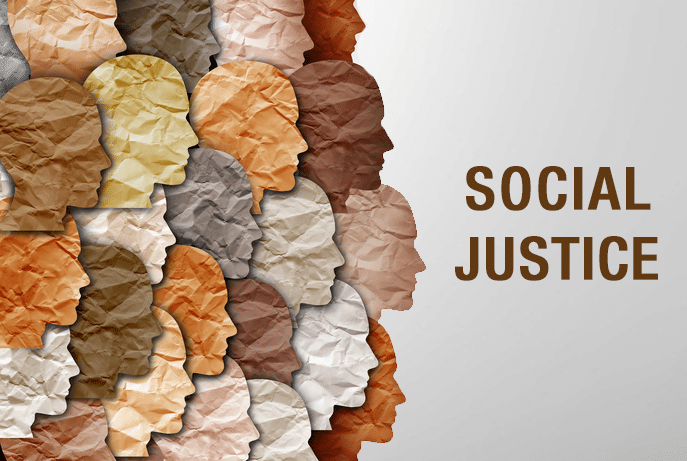 We live in a society that is rapidly changing. The worldwide pandemic has shown us the harsh, but important, reality that divisiveness, inequality, and discrimination persist in our country. The murders of George Floyd, Ahmaud Arbery, Breonna Taylor, and too many others are stark evidence that racism still has deep and seemingly impenetrable roots in our country. This profound moment in time has brought despair to and heightened protest not only within the Black American community, but to people of all races throughout our country and the world. While addressing and rectifying these injustices requires the concerted effort of all American citizens, educators play an essential role in creating and ensuring an equitable existence for everyone.
We live in a society that is rapidly changing. The worldwide pandemic has shown us the harsh, but important, reality that divisiveness, inequality, and discrimination persist in our country. The murders of George Floyd, Ahmaud Arbery, Breonna Taylor, and too many others are stark evidence that racism still has deep and seemingly impenetrable roots in our country. This profound moment in time has brought despair to and heightened protest not only within the Black American community, but to people of all races throughout our country and the world. While addressing and rectifying these injustices requires the concerted effort of all American citizens, educators play an essential role in creating and ensuring an equitable existence for everyone.
Throughout our nation’s history, education has been pivotal in fostering citizenry. Abolitionist leaders understood the importance of a quality public education in promoting democracy. William Lloyd Garrison called for “a broader basis for government which includes all the people, with all their rights in their hands, and with an equal power to maintain their rights.” Wendell Phillips insisted that knowledge was given to impart upon others. Harriet Tubman instilled within us that “every great dream begins with a dreamer.” And Frederick Douglass wrote that “once you have learned to read, you will be forever free.”













 More than ever, AACTE members are focused on disrupting inequities and advancing racial justice. AACTE is offering two great new opportunities for members to engage in this work with colleagues from across the country. The AACTE Board of Directors recently created two new committee:
More than ever, AACTE members are focused on disrupting inequities and advancing racial justice. AACTE is offering two great new opportunities for members to engage in this work with colleagues from across the country. The AACTE Board of Directors recently created two new committee:


 In Part 2 of this Q&A feature, AACTE consultant Jane West, a former teacher with a doctorate in special education and 30 years of policy experience in the nation’s capital, and Holmes Program Alumna Ashley L. White, assistant professor at the University of Wisconsin and 2019-20 Joseph P. Kennedy Fellow, share their mentoring/mentee relationship and how it has evolved over time to address race. (
In Part 2 of this Q&A feature, AACTE consultant Jane West, a former teacher with a doctorate in special education and 30 years of policy experience in the nation’s capital, and Holmes Program Alumna Ashley L. White, assistant professor at the University of Wisconsin and 2019-20 Joseph P. Kennedy Fellow, share their mentoring/mentee relationship and how it has evolved over time to address race. (
 We live in a society that is rapidly changing. The worldwide pandemic has shown us the harsh, but important, reality that divisiveness, inequality, and discrimination persist in our country. The murders of George Floyd, Ahmaud Arbery, Breonna Taylor, and too many others are stark evidence that racism still has deep and seemingly impenetrable roots in our country. This profound moment in time has brought despair to and heightened protest not only within the Black American community, but to people of all races throughout our country and the world. While addressing and rectifying these injustices requires the concerted effort of all American citizens, educators play an essential role in creating and ensuring an equitable existence for everyone.
We live in a society that is rapidly changing. The worldwide pandemic has shown us the harsh, but important, reality that divisiveness, inequality, and discrimination persist in our country. The murders of George Floyd, Ahmaud Arbery, Breonna Taylor, and too many others are stark evidence that racism still has deep and seemingly impenetrable roots in our country. This profound moment in time has brought despair to and heightened protest not only within the Black American community, but to people of all races throughout our country and the world. While addressing and rectifying these injustices requires the concerted effort of all American citizens, educators play an essential role in creating and ensuring an equitable existence for everyone.